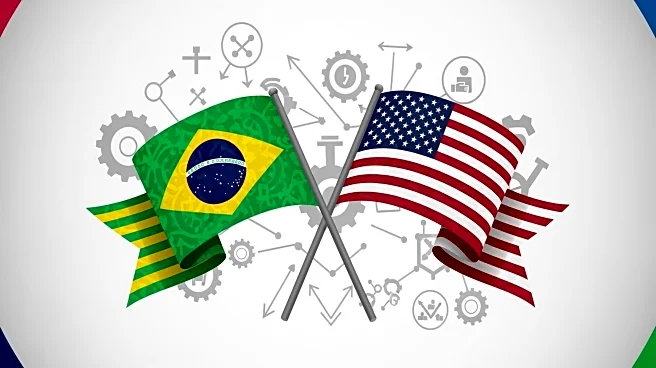What's Happening?
Brazilian President Luiz Inacio Lula da Silva announced that Brazil and the U.S. will begin immediate discussions to address tariffs and sanctions imposed by the U.S. on Brazilian goods. The announcement
followed a meeting with President Donald Trump at the ASEAN summit in Malaysia. Trump had previously increased tariffs on Brazilian imports to 50%, linking the move to a 'witch hunt' against former Brazilian President Jair Bolsonaro. Lula described the tariff hike as a 'mistake' and emphasized the need for negotiations to resolve trade tensions and sanctions against Brazilian officials.
Why It's Important?
The initiation of talks between Brazil and the U.S. is a significant step towards resolving trade disputes that have affected bilateral relations and global trade dynamics. The high tariffs on Brazilian goods have impacted industries such as beef and agriculture, leading to increased prices and trade shifts. Successful negotiations could restore trade balance and improve economic ties between the two countries, benefiting exporters and consumers alike. The discussions also reflect broader geopolitical strategies, as both nations seek to navigate complex international relations.
What's Next?
Negotiations between Brazil and the U.S. are expected to focus on reducing tariffs and addressing sanctions. Brazil has requested the suspension of tariffs during the negotiation process, although it is unclear if the U.S. will agree to this request. The outcome of these talks could lead to significant changes in trade policies, potentially influencing global market trends and economic strategies. Stakeholders in both countries, including government officials and industry leaders, will closely monitor the progress of these discussions.
Beyond the Headlines
The trade talks between Brazil and the U.S. highlight the interconnectedness of global economies and the impact of political decisions on international trade. The discussions may also influence broader diplomatic relations, as both countries seek to strengthen partnerships and address mutual concerns. Additionally, the negotiations underscore the importance of dialogue and cooperation in resolving trade disputes, promoting stability and growth in the global economy.











